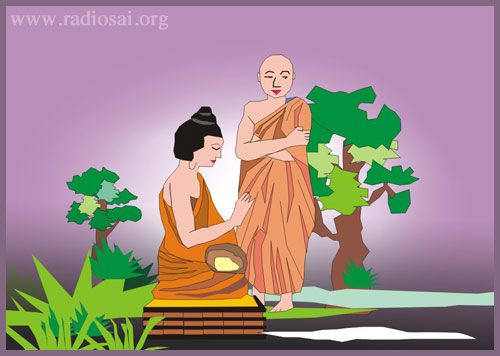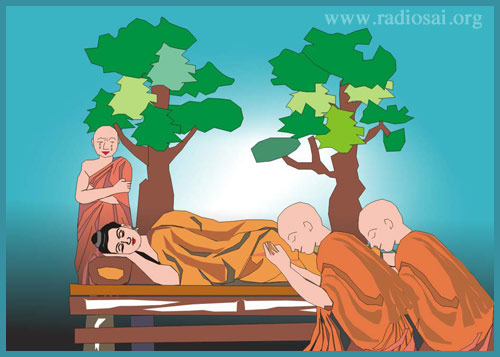Home >>Feature Article |
|
|
| 'Like' us on Facebook | Follow us: |
Posted on : June 12, 2012
STUDY CIRCLE - 7
LIKING SWAMI VERSUS LOVING SWAMI
PArt 01
Radio Sai Study Circle series was started in September 2010 to discuss and elaborate on Baba's teachings. The last episode of this series was on the theme ‘Understanding Love in all its Dimensions’ and we did receive plenty of positive feedback from all over the world. Here are just a few:
Mr. Sriram Bandhi from New Jersey said, “Your study circles are very informative and covers practical issues that are necessary to guide confused minds constantly looking for solutions. I eagerly await your study circles. Thank you for bringing Swami’s teachings to us.”
Ms. Shobha Roa from Mumbai said, “It’s been a pleasure to read and listen to study circle episodes. The sublimation of desires was a new method to me and as usual Swami has shown me a path to move in the right direction. Thank you Radio Sai for bringing me closer to Swami.”
“I’m a mother of two children,” said Ms. Lakshmi, “and to learn from one of your study circles that I am only a custodian is a great lesson that Swami has given me. It was a good, simple and valuable discussion.”
Similarly, Dr. Lata Sri Sathya Kumar from Oman said, “The study circle on ‘love’ was systematic, structured and beautiful. Could you please do a discussion on ‘surrender’?”
A session on surrender is definitely in the pipeline. However, the topic for discussion in the current study circle is also very pertinent. We say 'We love Swami', do we actually love Him? You will know at the end of this article.
As with the previous study circles, this edition too has Mr. G. S. Sri Rangarajan (GSS) as the moderator, and Bishu Prusty (BP), Amey Deshpande (AD), Sai Giridhar (SG) and K. M. Ganesh (KMG) as the participants.
GSS: ‘We love you Swami!” We have uttered these words uncountable times to Bhagawan. But today, we will discuss what exactly we mean by the term ‘Loving Bhagawan’. Is it loving just His physical form? Is it following His message? Or does it have to do with living His message?
I would like to start this exploration with my own example. Every day, I do whatever Swami wishes me to do; I wake up in the morning, chant His name, do pooja and worship, and in the evening, I sing bhajans. I do all of these because I love Bhagawan. So is this what we mean by loving Bhagawan or is it something more than this? It is important to deliberate on this because many a times we find a dichotomy, where people say ‘I do what Swami says. Is there something more that is expected of me? Does it mean that we have to literally live His message throughout our lives?’ In short, let’s aim to find out the purport of the words ‘We love you Swami’.
 |
AD: I am reminded of one very beautiful experience that happened in the Trayee Brindavan during the Trayee sessions. Bhagawan was sitting on the jhoola (swing) and in His inimitable style said, “So boys, do you love Me?”
In response, there was a thunderous chorus, “Yes Swami, we love You!”
Bhagawan’s reaction, however, was very different. Nodding in disapproval, He said, “No, my boys don’t love Me, My boys only like Me.”
Everybody wanted to now know the difference between ‘loving’ and ‘liking’ Bhagawan.
And then Swami went on to explain this in a very beautiful manner, He said, “You have a dog at home and all along you pet the animal and caress it, you give it a bath and want to play with it, feed it, etc. But do you really follow the dog through every moment of its life. Wherever the dog runs, do you run behind it? No, you don’t. Then, how can you say whether you like or love the dog?”
And then, Swami said something that probably hurt a lot of us. He said, “My boys like Me too in the same manner.
They want to be with Me and around Me, they want to feed Me and see Me happy but don’t want to follow what I say.”
And then He said: “To love Swami is to follow Swami.”
On this note, let us rephrase today’s topic as ‘Loving Swami vs. Liking Swami’.
Difference Between Liking Swami and Loving Swami
GSS: That’s beautiful. I think there is a profound difference between the two. Giridhar, what do you feel about this?
SG: I think Amey has brought up a profound point. I say this because Swami would often tell us students that when we are in His presence, we tend to follow all the discipline that He expects us to follow but the moment we return home, we start watching TV, go to the movies and indulge in other past times.
Probably, even I was a victim to this particular routine until a few years ago when we would conditionally or conveniently follow Swami’s teachings as per our choice. For example, Swami has categorically mentioned that television is tele-visham - poison. It was actually surprising that as long as we were in Prasanthi Nilayam, we were somehow happy not to be able to watch television.
But as soon as I got home, I don’t know why but I would watch TV all the time. And I think that is something which differentiates liking from loving. As Amey says, true loving is to follow Bhagawan’s teachings through every moment of your life, and not just when you are within His immediate vicinity. Bhagawan has reiterated this to us several times.
GSS: Do you mean, it’s not just about rituals but it is about embodying the essence of the rituals. Bishu, what’s your take on this?
BP: As Giridhar just mentioned, I can think of a few situations that most of us would have experienced. For instance, you see people who are very regular for bhajans and nagar sankirtan. You admire them for their commitment to making time and attending these sessions. But somehow you feel that their devotion to Swami does not extend beyond that. While one would think they epitomise the ‘ideal devotee’, you actually would like to see a better manifestation of the traits that Swami often talks about.
In other words, instead of limiting the love to a few aspects of devotion, it must translate into everything that we do in our daily lives.
GSS: In other words, we compartmentalise our ‘love’ or ‘like’ for Bhagawan and demonstrate our devotion ‘now and then’.
BP: I remember, during darshan sessions, most of the boys or devotees would reserve a place in the line and then go to drink water. When they return, if they find that their mats have been moved even by an inch, they would give a withering look to the person sitting next to them. But the moment Swami appears for darshan, they instantly flash their brightest smile.
 |
 |
 |
 |
 |
 |
 |
 |
KMG: Unfortunately, most of us are oblivious of the fact that we tend to do this.
BP: I have also experienced this attitude quite often.
GSS: But, the smile could also be interpreted as love for Swami.
BP: Ironically, while the person is absolutely sure that the smile expresses love for Swami, it does not bother him or her that they have just hurt a fellow devotee with that harsh look.
KMG: You will also find people who say 'we love Swami' and are ready to sacrifice their personal time, family and professional engagements, money and what not in the name of commitment to Bhagawan’s mission. But they must also remember that they have to balance their rules in life. There are certain commitments that an individual may have towards his or her family and profession that must not be compromised in the name of Swami’s work. In fact, Swami has often said that all work is His work.
BP: That’s right.
KMG: I remember a young boy sharing his feelings with one of our senior faculty members. He spoke about how his mother was a Bal Vikas guru and was so immersed in Sai organisational activities that she had no time for her own son. She was not even giving the minimum attention that a child deserves from his mother. That is why in Swami’s work if we have not learned to balance ourselves, then we have totally missed the point. All work is His work.
What is True Love for God
GSS: The understanding that is emerging now is that liking God is something very limited; it is selfish and narrow-minded and indicates an act of self-interest. On the other hand, loving God is when you love Him for His sake. You follow His message. The approach is selfless and unlimited.
Let us now dwell a little more on how we first start with trying to love God, and then get so overpowered with several things that we unconsciously forget that we are not loving God but actually harming Him. We could illustrate this point with real life experiences and anecdotes. Bishu, perhaps you can give us your thoughts first?
BP: I am reminded of a story from the life of Buddha. Ananda was His cousin and when Buddha attained enlightenment, Ananda decided to spend all his time with Him. But before taking initiation, he wanted to make sure that he is not treated at par with all the other disciples and wished to retain his status as the elder cousin brother of Buddha.
So, he went to Buddha and said, “Being my younger brother, it is Your duty, Buddha, to obey me. After my initiation, you will become my master and I your disciple and I will not be able to ask or command anything. So, before I receive initiation, allow me to ask you a few things.”
Buddha said, “As you please, go ahead Ananda, what do you want?”
 |
Ananda uttered his three wishes. His first wish was: “I should always be with you, you shall never talk to anyone in secret and you shall never send me away.”
GSS: He was exerting his copyright over God!
BP: Yes. Ananda’s second wish was: “Whenever I would like you to meet someone, at any time of the day or night, you shall not refuse.”
AD: Basically, he wanted Buddha to stay in a cage!
BP: And here is the third wish: “You and I shall sleep in the same room, I should always be with you.”
After articulating the three wishes, he said, “Buddha, do not forget these wishes of mine. I am now ready to be initiated.”
GSS: Would you call Ananda’s attitude as love for Buddha?
AD: I don’t think it was love.
BP: There is lot more to the story! So Buddha says, “Fine, please get initiated.” Ananda became His disciple and he was virtually the shadow of Buddha. He was always by His side.
Many years later, when it was time for Lord Buddha to depart, He said, “By dusk tomorrow I shall be gone. Call all the monks. I want to address you all one last time.”
As the Buddha had wished, about 1,000 enlightened monks stood around Buddha - calm and composed. No one cried or showed any visible sign of grief – apart from Ananda.
Ananda was in deep anguish. He was inconsolable and the other monks didn’t know how to pacify him. Out of mercy, Buddha looked at Ananda and smiled. He asked, “Ananda, why do you cry, I have done everything that you wanted me to do. I have fulfilled all your wishes during this entire time that you have been with me.”
When Buddha said this, Ananda cried even more and said, “Buddha, I don’t know what I will do with my life now. I breathed the same air that you breathed, I did everything that you did but I have not attained enlightenment and now I feel my life is hopeless. I don’t know how to live without you.”
 |
Then Buddha said, “What can I do Ananda? I did everything that you wanted me do. I always knew that if I fulfilled your wishes, I would only be hindering your spiritual progress but you were not willing to forget that I was your younger brother. You wanted to retain all those privileges; your surrender was conditional.”
Buddha went on, “Perhaps my death shall make it unconditional.”
And then Buddha left His mortal coil. All the enlightened monks congregated in close proximity. It was a moment of deep introspection. Ananda alone was not present in that gathering; he had become a complete emotional wreck. He spent that entire night crying as he was helpless and alone.
And, then he realised that although he had seen everything he had yet seen nothing. He understood that he had drunk from the fountain of nectar but he had not tasted the nectar. For the first time, he felt a void in his life.
And, on that night, in that deep silence, began his process of self-introspection. During that night of profound self-discovery, realization dawned on him. And, as the morning broke, he was engulfed in a deep sense of peace. Over time, his process of self-realization deepened.
Brothers, if we look at Ananda’s example, when he was a shadow to Buddha during his lifetime, I would say that he only ‘liked’ Buddha. It was only after Buddha left His mortal coil that Ananda began to ‘love’ Him. If only Ananda had ‘loved’ Buddha when He was with him in the physical form, imagine what a wealth of spiritual development he would have gained for himself.






